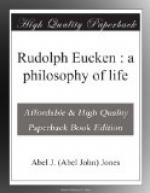The progress of humanity, then, must become the aim of life—all our strength and effort must be focussed upon human nature itself. But an immediate difficulty arises. Where are we to find Man? “Is it in the social community where individual forces are firmly welded together to form a common life, or among individuals as they exist for themselves in all their exhaustless diversity?” If we put the community first, then the social whole must be firmly rooted in itself and be independent of the caprice of its members. The duty of the individual is to subordinate himself to the community—this means socialism. If, on the other hand, the great aim is to develop the individual and to give him the maximum of opportunity to unfold his special characteristics, we arrive at an opposing theory—that of individualism.
In the history of society we find an age of socialistic ideas followed by one of individualistic ideas, and vice versa, and there is much that is valuable in each, in that it tends to modify and disprove the other’s extreme position.
The present wave in the direction of socialism arises, to an extent, in reaction from the extremely individualistic position of previous ages. Man is now realising that the social relations of life are of importance as well as the character of his own life. He realises the interdependence of members of a community, and the conception of the State as a whole, a unit, instead of a mere sum of individuals, grows up. The modern industrial development and the organisation of labour have, too, emphasised the fact that the value of the individual depends largely upon his being a part of society. His work must be in co-operation with the work of others to produce the best effect; for in such co-operation it produces effects which reach far beyond his own individual capacity. Hence his life appears to receive value from the social relations, and the social ideal is conceived. The development of the individual no longer becomes the aim but rather the development of the community. In setting out the development of society as his aim, the individual makes considerable sacrifices. All that is distinctly individual must go, in character, in work, in science, and art, and that which is concerned with the common need of society must receive attention. This means undoubtedly




